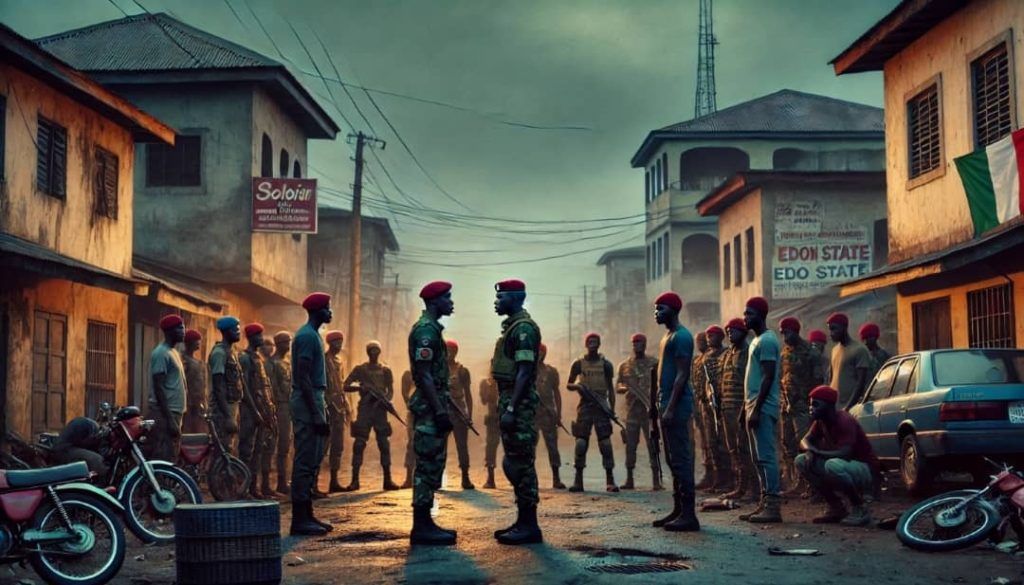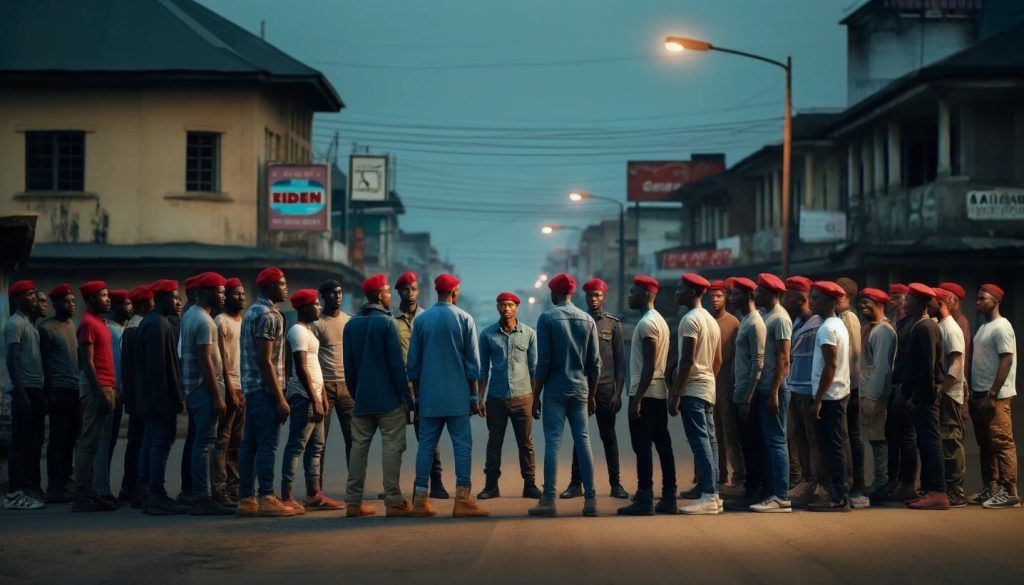Crime/Law Enforcement
Blood Bath In Benin: Cult Wars Ravage Edo State
In recent years, Benin City, the capital of Edo State, has transformed into the epicenter of cult-related violence, marking a disturbing escalation in bloodshed.
Once a vibrant and cultural heart of Nigeria, this historic city is now tarnished by lifeless bodies scattered across streets and neighborhoods, casualties of the relentless conflict between rival cult groups.

The situation worsened with the recent breakdown of peace talks between the Eiye and Vikings cult groups, a dispute that has escalated into a full-blown war, tragically taking multiple lives.
The Cost of Cult Violence: Loss of Life and Rising Fear
The most recent clash, sparked by a minor altercation in the Upper Sakponba area, led to the deaths of several individuals. This conflict continued to spiral as both groups declared open war following a failed peace meeting.
The initial incident saw Eiye members accuse Vikings representatives of instigating the fight, and with tensions high, the peace talks quickly dissolved into accusations, eventually leading to open conflict.
As of this morning, the violence shows no signs of abating, with new fatalities reported.
Such violent clashes are not isolated. Countless stories reveal a tragic pattern in Edo State, where young men lose their lives to brutal turf wars between these groups.
Local reports document assassinations, street executions, and bodies left as grim reminders of the relentless grip that cultism has over Edo State.
With each incident, residents of Benin City and surrounding areas are forced to live in constant fear of becoming collateral damage in this ongoing battle for supremacy.
Politicians and Cultists: A Deadly Alliance
 MO
MO
The rise in cult activities in Edo State has raised alarming questions about the involvement of political actors in the ongoing violence.
Evidence and allegations have surfaced, indicating that certain politicians finance or even directly sponsor these cult groups, using them as the militant arm of their political aspirations.
For some, these alliances provide a means to enforce power and intimidate opposition, but the cost is borne by innocent citizens caught in the crossfire. In Edo State, the line between politics and cultism has blurred, complicating efforts to establish law and order and ensuring that these groups remain well-funded, organized, and deadly.
This financial and logistical backing allows cult groups to thrive, emboldened by the knowledge that they have political support behind them.
These politicians, instead of fostering peace and stability in their constituencies, appear to have prioritized their political ambitions over the safety of their citizens.
A Weak Law Enforcement Response and Allegations of Complicity
The inability of the police to effectively curb cult-related violence has further emboldened these groups, who operate with an alarming sense of impunity.
Many citizens now view the police force as either incapable or unwilling to address the issue. Rumours even suggest that certain police officers may be complicit, allowing cult activities to flourish within Edo State.

Additionally, the recent ban on the activities of the Edo State Security Network (ESSN) by the Inspector General of Police has further weakened the state’s defense against these criminals. With the ESSN disbanded, cultists face fewer barriers, and police efforts have not been enough to fill the gap left by the ban.
The timing of this decision, shortly before the Edo elections, has raised concerns over the sincerity of the police force in genuinely addressing the surge in cult-related crime.
It remains unclear whether this decision was motivated by political interests, but what is evident is the toll this has taken on public safety.
The Devastating Effects of Cult Clashes on Edo State
The unending violence in Benin City has cast a long shadow over Edo State’s economic and social prospects. Businesses are reluctant to invest in a region where death and violence seem to dominate the news.The tourism sector, once a promising avenue for economic growth, has suffered tremendously.
Benin City, known for its rich cultural heritage, historic sites, and unique artifacts, now struggles to attract visitors due to its notorious reputation for violence and instability.
Events and festivities that once brought people together and celebrated the city’s rich heritage have become rare, as the specter of violence looms large over every gathering.
Beyond the economic impact, the frequent cult wars have also disrupted the social fabric of Edo State. Families are torn apart by the loss of loved ones, and communities are left grappling with the trauma of witnessing bloodshed and violence daily.
Young people, instead of focusing on education and self-improvement, are often drawn into these conflicts, either through peer pressure or as a means of survival. Cultism has seeped into every layer of society, making it difficult for families to feel safe and for communities to trust one another.
A Call for Change
The continuous bloodshed in Benin City calls for urgent and effective action. The Edo State government, local authorities, and law enforcement must work collaboratively to dismantle the networks fueling cultism. Addressing this crisis requires not only enforcing stricter laws but also dismantling the political structures that empower these cult groups.
Accountability is crucial – both for politicians who fund these groups and for police officers suspected of aiding them. Only by restoring integrity within the police force and addressing political corruption can Edo State hope to regain peace and stability.
Without decisive action, Edo State will continue to suffer from the devastating impact of these cult wars. The lives lost, the shattered families, and the damaged reputation of Benin City as a cultural and historical landmark in Nigeria are a tragedy that demands immediate attention.
As citizens and leaders alike, there must be a collective commitment to breaking free from the grip of cultism and rebuilding a society where peace, safety, and prosperity are achievable.
Discover more from Jojo Naija
Subscribe to get the latest posts sent to your email.
